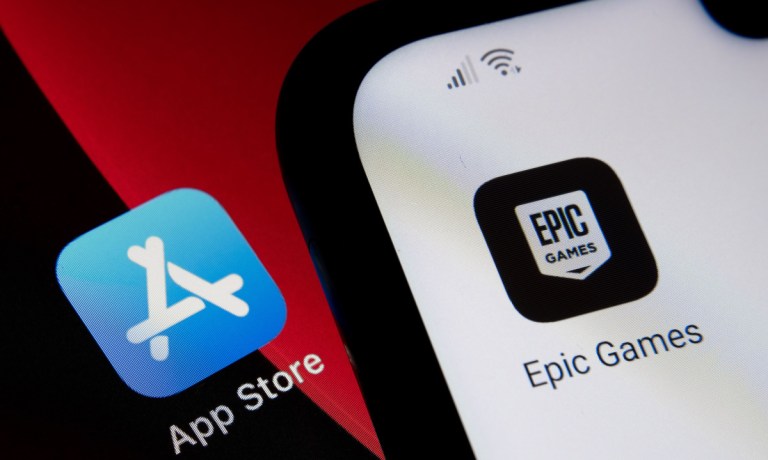## Apple vs. Epic: Round Two? App Store Submission Drama Heats Up! Remember the Epic Games vs. Apple trial that shook the gaming world last year? Well, grab your popcorn, gamers, because the drama is back! Apple is throwing down the gauntlet, vehemently denying Epic Games’ claims that they’ve been unfairly blocked from submitting new apps to the App Store. Is this a PR battle, a legal chess match, or something more sinister? We dive deep into the PYMNTS.com report to uncover the latest twists and turns in this epic showdown, exploring what it means for developers, gamers, and the future of mobile gaming. Get ready for another clash of titans!
Unpacking the EU’s Digital Markets Act and its Impact on Apple’s App Store Policies

The European Union’s Digital Markets Act (DMA) has been a significant catalyst in the ongoing legal battle between Apple and Epic Games. The DMA, enacted in 2022, aims to curb the dominance of large tech platforms and promote competition within the digital market. A key provision of the DMA compels “gatekeeper” platforms, such as Apple’s App Store, to allow users to download and install apps from sources outside their official stores. This effectively challenges Apple’s longstanding policy of requiring all apps distributed on iOS devices to go through the App Store, where Apple takes a 30% cut of in-app purchases.
Apple has argued that the DMA’s requirements would compromise the security and privacy of its users. However, Epic Games contends that the DMA is necessary to foster innovation and choice within the mobile app ecosystem. The DMA’s impact on the App Store is still unfolding, and its long-term consequences remain to be seen.

Epic’s Legal Success: Reviewing the Court Ruling That Required Apple to Allow Third-Party Payment Options Within Its App Store
In a landmark legal victory, Epic Games successfully challenged Apple’s App Store policies in a 2021 lawsuit. While Apple prevailed on most of Epic’s original claims, the court ruled that Apple must allow developers to offer alternative payment options within their apps, thereby circumventing Apple’s in-app purchase system and its associated 30% commission.
The court found that Apple’s restrictions on third-party payment methods constituted anti-competitive behavior, stifling competition and limiting consumer choice. Subsequently, in April 2023, a judge ruled that Apple had deliberately circumvented the initial court order to allow third-party payments, leading to Apple’s appeal.

Fortnite’s Return to Europe: Discussing the Temporary Availability of Fortnite on iOS in Europe Through Epic Games’ App Store and its Subsequent Blocking
Following the April 2023 court ruling, Epic Games CEO Tim Sweeney announced that Fortnite would return to the US iOS App Store the following week. He also highlighted the company’s willingness to return Fortnite to all App Stores worldwide if Apple extended the court-mandated frictionless, tax-free framework globally.
In the interim, Fortnite became available on iPhones in Europe through Epic Games’ own app store, a direct result of the DMA’s provisions allowing alternative app distribution. This marked a significant victory for Epic Games and a potential precedent for other developers seeking to bypass Apple’s App Store controls.
However, this short-lived period of Fortnite’s availability outside the App Store was abruptly ended when Apple blocked Epic Games’ resubmission of the game to its App Store, effectively preventing its distribution through both the US App Store and the Epic Games app store in Europe.
Apple’s Appeal and the Ongoing Fight
Apple’s Legal Strategy
Apple’s decision to appeal the judge’s ruling and maintain its stance against complying with the court order reflects the company’s commitment to defending its App Store policies. Apple argues that the DMA’s requirements threaten the security and privacy of its users and undermine the integrity of its ecosystem.
The company maintains that its App Store model allows developers to reach a vast audience and benefit from a safe and curated environment. However, critics contend that Apple’s approach stifles innovation and creates an unfair competitive advantage for its own services.
The Future of Fortnite on iOS
The legal battle between Apple and Epic Games has far-reaching implications for the future of Fortnite on iOS devices. The outcome of Apple’s appeal could determine whether developers are granted greater flexibility in distributing their apps and offering alternative payment options.
If Apple prevails, its App Store policies are likely to remain largely unchanged, potentially hindering the growth of competing app ecosystems and limiting consumer choice. Conversely, if Epic Games is successful, it could pave the way for a more open and competitive mobile app market.
Broader Implications for App Store Regulation
The Apple-Epic Games case has garnered significant attention from policymakers and regulators worldwide, highlighting the growing scrutiny of app store practices. The case could serve as a catalyst for stricter regulations governing app stores, aimed at promoting competition, protecting consumer privacy, and ensuring fair treatment for developers.
Depending on the final outcome, this case could influence the development of similar legislation in other jurisdictions, potentially reshaping the landscape of app distribution and payment models in the years to come.
Conclusion
Apple’s denial of Epic Games’ claims regarding App Store submission hurdles throws a wrench into the ongoing saga of the App Store’s policies and practices. While Epic alleges a systematic blockage of their submissions, Apple maintains a stance of transparency and fairness, emphasizing a robust review process designed to protect user safety and maintain the integrity of its platform. This clash of narratives highlights the fundamental tension between platform control and developer freedom, a battle that continues to resonate throughout the tech industry.
The implications of this dispute are far-reaching. It could influence future regulatory scrutiny of Apple’s App Store practices, potentially leading to changes in app review policies or even antitrust actions. Moreover, the outcome will likely shape the relationship between Apple and independent developers, potentially impacting the future of app innovation and the diversity of experiences available on iOS. As the legal battle progresses, all eyes will be on how this conflict unfolds and what it means for the future of mobile gaming and the tech landscape as a whole.
Ultimately, the question remains: who will control the gate to the digital marketplace? Will it be the established giants, wielding their platform power, or will developers find new avenues to reach their audiences, ushering in a more decentralized and competitive future? The answer, dear gamers, lies somewhere in this intricate dance between innovation and control, and the stakes have never been higher.